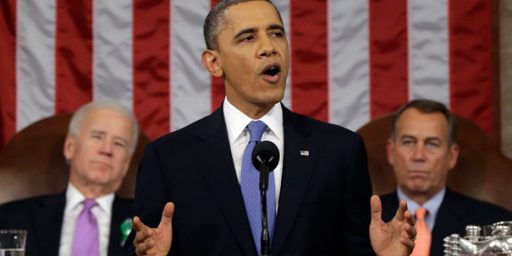On the History of the Filibuster
Stop romanticizing the filibuster (and don't appeal to the intent of the Founders).

Dana Milbank has a column that is quite critical of Mitch McConnell’s, shall we say, “flexibility”: Mitch McConnell, the man who broke America.
First, the headline (which comes from the text of the column, so can’t be blamed on whomever it was that named the piece) is a bit much. McConnell owns a huge share of responsibility for recent politics, to be sure. His prominence in leadership of the Senate GOP makes him responsible by definition. But the current era of political polarization is bigger than McConnell. And, to be fair (I know, who wants to be fair in politics?), obstructionism, or even situational flexibility are not , per se, out of bounds in politics. Indeed, they are often necessary tools of the politician.
Further, doing away with the filibuster, even the legislative filibuster, is not the breaking of America (as if the essence of the US is the protection of minority obstructionism in the Senate).
Second, having said that: I think that the criticism of McConnell’s cynicism is fair insofar as his hypocrisy on the filibuster issue is quite stark.* Further, his immediate reaction to the death of Scalia and his subsequent treatment of Garland was a major breach of the norms of US politics.
Nonetheless, third, this bugged me from Milbank:
In the current cycle of partisan escalation, it’s only a matter of time before the filibuster is abolished for all legislation, killing the tradition of unlimited debate in the Senate dating back to 1789. The Founders did this so minority rights would be respected and consensus could be formed — and McConnell is undoing it.
There is currently a good deal of situational romanticizing of the filibuster at the moment. We have here an appeal to the “The Founders” and to the very origins of the Senate. But this is not accurate.
To wit, Sarah Binder, who is an expert on this very topic, provided the following in testimony before the US Senate Committee on Rules and Administration in 2010:
We have many received wisdoms about the filibuster. However, most of them are not true. The most persistent myth is that the filibuster was part of the founding fathers’ constitutional vision for the Senate: It is said that the upper chamber was designed to be a slow-moving, deliberative body that cherished minority rights. In this version of history, the filibuster was a critical part of the framers’ Senate.
However, when we dig into the history of Congress, it seems that the filibuster was created by mistake.
Spoiler: it was Aaron Burr’s fault. He recommended that the motion to call the question be removed from the rule book as part of a cleanup of the rules. Without the ability to call the question, discussion on an issue can theoretically go on forever. Anyone who has ever operated in an environment using Robert’s Rules knows the value of being able to call the question deep into a long afternoon meeting (especially, ironically enough, in a meeting of the Faculty Senate).
Binder continues:
Once the rule was gone, senators still did not filibuster. Deletion of the rule made possible the filibuster because the Senate no longer had a rule that could have empowered a simple majority to cut off debate. It took several decades until the minority exploited the lax limits on debate, leading to the first real-live filibuster in 1837.
And from her conclusions:
the history of extended debate in the Senate belies the received wisdom that the filibuster was an original, constitutional feature of the Senate. The filibuster is more accurately viewed as the unanticipated consequence of an early change to Senate rules.
As such, one can see that Milbank is simply incorrect to romanticize the intent of the Founders in all of this (and Milbank isn’t alone).
I would recommend the entire piece, which also includes the secret origin of the cloture rule: The History of the Filibuster. And if one wants more, I suggest Binder’s book on the subject (as well as her other work).**
Part of the lesson here is that institutional rules change over time, and they often do not change as the result of some grand plan. And even when there is a plan, the exact implications of the change are not always fully known. Aaron Burr had no idea what his suggestions to cleanup the rules of the Senate would create. And, I would hasten to add, even if he did, the fact that he was, broadly cast, one of the “Founders” does not make his choices unassailable or wise.***
BTW: I am largely in favor of the utter removal of the filibuster insofar as I do not see the usefulness of allowing the minority to have that much power (especially since the nature of the manuever was such that a lone Senator could gum up the works by threatening s filibuster–this was far more a procedural maneuver than it was some grandiose exercise in deliberation). Indeed, too many people have their view of the filibuster linked to tales of heroism by Jimmy Stewart than they do actually understanding of Senate rules.
I will admit that the one area where I might could be persuaded of the need for a super-majority might be for SCOTUS nominations, given the significance of the institution and the fact that their terms are for life. Further, it is possible for the minority of citizens to have power in the Senate due to the anit-democratic distribution of seats in the chamber, which has implications for naming a Supreme Court Justice in the sense of empowering national minorities on this topic. Having said that, such a rule would have to be in the constitution itself, not subject to the alteration by the majority party of the chamber. And, having said all of that, the reality is that winning the White House and the Senate empowers a given party to act (elections having consequences, and all that).
The interesting thing is going to be: what happens the next time we have divided government between the White House and the Senate? I am guessing that we will see some more long vacancies on the Court (and this is because of the Garland precedent, not the elimination of the filibuster). For example: if the Democrats win the Senate in 2018, and Trump gets a nominee any time in his last two years in office, the chances of a loooong vacancy strike me as high. In reality, since the majority had the nuclear option at their disposal and the political context that would allow it use, the filibuster was dead for SCOTUS nominations well before the actual vote took place.
—-
*Not that anyone in the Senate has covered themselves with glory in terms of consistency on this topic.
**See, also, Kroger, Gregory. 2010. Filibustering: A Political History of Obstruction in the House and Senate. University Of Chicago Press.
***Seriously, Burr did a lot of things that I would suggest are not worthy of imitation.






As a practical matter, it’s an utterly dumb idea for liberals to call for an end to the filibuster, as it is the only check-and-balance available to the party that is out of power (read: their party.)
I can certainly understand why Republicans want to end the filibuster: They want a one-party state and they will do anything that they can to get one. But liberals are idiots to help them.
@Pch101: As per the Gorsuch thread, you know that I agree with that in terms of a short-term tactical matter.
Over the long haul, I am not a fan of the filibuster (but, then again, I am not a big fan of the Senate as it is currently instituted).
ed brayton and nate silver argue that the filibuster has been used to deny progressive accomplishments more than conservative ones, and that liberals would make more progress in the long run without it:
http://www.patheos.com/blogs/dispatches/2017/04/07/good-riddance-filibuster/
@teve tory: Indeed, perhaps that most famous filibuster was that against the Civil Rights Act.
@teve tory:
In the long run, we’re all dead.
In the short run, this is an absolutely atrocious idea for liberals to want this, and it should be obvious why that is the case.
maybe you could read the articles i linked to.
@Steven L. Taylor: And obamacare almost certainly would have had a public option without the filibuster.
@Steven L. Taylor:
Fair enough. But we’re never going to have the multi-party parliamentary system that you seem to prefer, and we have to deal with what we have.
Since American populism tends to veer toward the xenophobic end of the spectrum and some states seem programmed to wage a war on decency, we need something that makes it harder to repeal the gains at the federal level that we have made. Those gains were not easy to get and will be difficult to resurrect if lost.
@teve tory:
No article can change the fact that the GOP controls the House, the Senate and the White House.
This is a simple arithmetic question, and nothing more.
@Pch101: Sure, there is not going to be multi-party parliamentarism in the US, but that isn’t really my point here.
However, I would counter with this: the reality is that the filibuster blocks more than it saves. As teve tory notes above, had it not been for the filibuster, the ACA would have been more well refined (for all practical purposes a rough draft of the bill was passed because that was all that could get through).
However, as the AHCA failure illustrates, taking away privileges is hard–even in a body that functions by pure majority rule.
Further, I would prefer a situation in which majorities have to take responsibility for governing–and I don’t mind the notion that policy could actually change as partisan control changes. At least then the public will have a clear understanding of who stands for what.
And I further suspect that, in general, the filibuster has been more a tool for reaction than for progress.
Above all else, this era of polarization means that the filibuster is effectively dead anyway, but the nuclear option is always available for the majority.
And, really, it isn’t as nuclear as it sounds.
@Steven L. Taylor:
I understand that the filibuster appears to favor conservatives generally because it makes change more difficult.
But it cuts both ways. The changes that do occur in the US typically favor liberalism, and the filibuster makes it more difficult to unwind those changes.
If you want to protect the gains that are made, then getting rid of the filibuster is a bad idea. But that requires accepting the trade off that the filibuster makes it more difficult to implement those changes in the first place. The filibuster slows things down in the front end, but it also serves to institutionalize those changes once they have been made.
@Pch101: It is clearly a status quo tool in an already skewed to status quo chamber. As such, I think it does more to hamper positive change than it does to prevent damaging change.
(You can’t protect change that is constantly thwarted).
The filibuster was a normal part of our relatively functional democracy for 150 years. It then took several decades for it to metastasize into the cancer it is now. When something has forced you to abandon a 180 year old tradition, you should probably focus more on the cause than the effect.
It’s a bit like when people yearn for an American parliament. They think having the same form of government as Europe will produce the same results as Europe. But divorced from the centuries of historic and cultural tradition that supports it, an American parliament would be a vastly different place.
Mike
@Steven L. Taylor:
Hypothetically,
Say that Democrats decided to save the filibuster for the next such Supreme Court nominee event, and say that the mathematics of Congress are the same as now, and finally, say it’s Ginsburg resigning because of health reasons.
Why would the next Supreme Court nomination situation be any different? Would Democrats be expecting Republicans to nominate a liberal leaning justice because, after all, this is liberal seat being vacated? An absurd expectation.
I contend we would be in the same place, and Democrats would feel the same way as they do now, and McConnell would kill the filibuster at that later date.
Why would the filibuster be a effective weapon for Democrats given the behavior of the current Republican Party? I just don’t see it.
If you’re arguing that Democrats have to count the votes, passively accept the new reality, shut up and let these Republican Court nominations go through, and use the filibuster for lesser important obstructions, then I get it, other wise ….
The idea of a super majority for certain Legislation or for SC nominations is not that bad(I would not know if that could work with such strong and nationalized parties, where defections can be rare). On the other hand, the filibuster per se is silly.
@al-Ameda:
My main point in the Gorsuch thread was, ultimately, we don’t know what the math will be in the future, so might as well preserve the possibility (however small) that the math might be different in the future. What if in the next Senate the numbers didn’t exist for stopping a filibuster, but the chamber is still in Rep majority hands?
For all the bravado in that thread about how this was going to show Democratic fight for the base, it all pretty much was far more whimper than bang.
@Pch101:
True. But that isn’t an infinite state of affairs.
@dennis:
So you would rather plan for a future that may not happen for a very long time than deal with the present. How does that make any sense?
If you don’t like the filibuster, then I would suggest that you wait until there is a Democratic majority, instead of doing it now when it would only marginalize liberals even more.
@MBunge: “an American parliament would be a vastly different place”
I suspect it would involve firearms.
@Steven L. Taylor:
I guess the Republican filibuster of almost 80 of Obama’s nomination to lower courts was just a warm-up to McConnell’s plan to de-facto filibuster Garland’s nomination for 11 months. Republicans enjoy the filibuster while Democrats get the blame for “forcing” Republicans to eliminate a rule that Republicans love and relentlessly abused. I am not in mourning
Thank you! I’ve been frustrated for years at the use of the filibuster and the defense that the Senate needs it to protect the minority. The Senate was already set up to protect smaller states, and the filibuster allowed an even smaller, extreme minority to block most of the progress that might have occurred under the Obama administration. It also prevents some bipartisanship when the Senate is relatively equally divided because such a large number of members of the majority party would have to side with the minority party to pass a good bill that’s being blocked purely for partisan reasons. There are so few with the principles to stand for what’s right, but there are always a few.
@Pch101:
What, exactly, are you saying liberals could have done differently in the short run, that would have affected the outcome of… anything?
As you pointed out,
…and its corollary: the Dems can do nothing to stop the GOP from doing whatever the hell it wants to do. With or without the filibuster. So make the GOP own every iota of what they’re about to do to America.
I learned quite a bit on the subject from a book I read a few years ago called The American Senate: An Insider’s History, by Neil MacNeil and Richard A. Baker.
I’m interested in reading the Kroger book. Thanks for the recommendations.
@Pch101:
Right there is a good summation of why the filibuster has survived for this long. Neither party ever wants to get rid of it, because they find it too useful whenever they’re out of power. But unless you think the filibuster is inherently a good thing (and not simply something tactically useful for Dems at the moment), somebody’s got to take that step.
(I’ve heard more sophisticated arguments in defense of the filibuster–a popular talking point is that it makes the Senate into the “world’s most deliberative body.” Still, I really think the reason it’s survived this long is because no one has the guts to get rid of it, despite its being such an obviously ridiculous institution.)
@Pch101:
Pch, you are making assumptions here. I voiced no opinion about the filibuster, or what I thought about any possible future. I only stated a high probability. For the record, I do not support getting rid of the filibuster; I believe it is the one tool that protects the minority legislative party. Also, you make a large assumption about how soon or how late the political winds change. With this administration and GOP-led Congress, that is just impossible to know.
Thanks for the repartee, though.
@DrDaveT:
I am not referring to Congress, but to liberal members of this website’s commentariat who think that scrapping the filibuster entirely makes good sense for liberals.
Fortunately, the Senate seems inclined at this point to preserve the filibuster for legislation, and we should want to keep it that way. The hard right wants to scrap it because it sees the opportunity to create a one-party dictatorship that it desperately wants, and liberals should be fighting the wannabe despots instead of playing into their hands.
As I noted elsewhere, it may have been wise for Senate Democrats to have horsetraded something in exchange for a confirmation vote that could prevent the nuclear outcome (although I’m not sure if there was much to horsetrade.) Since confirmation was otherwise inevitable, the Dems could have tried to get something in exchange for Gorsuch’s confirmation instead of getting nothing while creating momentum for losing the legislative filibuster.
@MBunge:
True, that. The underlying cause is our extreme polarization. Once upon a time, before the Rs’
driftheadlong rush to the right, it was possible to find compromise in a fairly broad middle. But since the Civil Rights Act, the Southern Strategy, the growing presence of corporate money since the mid 70s, the emergence of explicitly RW media, and social media (now complete with Russian bots) amplifying RW media – not so much.@dennis:
I’m not assuming anything about the future, other than that there will be one.
I am noting that we live in the present and should base a decision like this on the present, rather than on some vague hope that Democrats will eventually get their revenge.
@Pch101:
And I am pointing out that “scrapping the filibuster” (or its opposite, “preserving the filibuster”) is not presently in the power of anyone but Republicans. Democrats can no more “scrap the filibuster” than they can choose to be subject to Earth’s gravity. The only question open to them was whether to collaborate with Republicans for a while (thus delaying the elimination of the filibuster to no purpose), or confront them immediately and make them invoke the nuclear option right now.
I have seen various people on this site opine that the latter is a better strategy than the former. I have even seen some say that Dems should make a virtue of necessity. I haven’t seen anyone, with the possible exception of Doug Mataconis, who seemed to think that preserving a functional filibuster power, even temporarily, was within the power of the Democrats. So who exactly are you arguing against?
Thus far, thirty-one Democrats in the Senate have signed a letter in support of maintaining the legislative filibuster. So I am in agreement with them; why anyone liberal who posts here would disagree with them is baffling.
As for avoiding the nuclear showdown on Gorsuch, I’ve already noted a possible alternative (although whether such a deal could have been brokered if attempted in earnest, I don’t know.) That doesn’t excuse the GOP, but as the minority party, the Democrats have little choice but to try to cut deals under limited circumstances such as these.